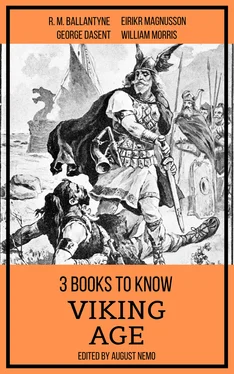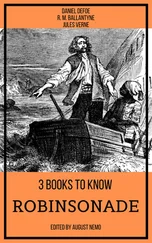Each man relieved Tyrker of several bunches of grapes, so that in a few minutes he resumed his own ordinary appearance. They then retraced their steps, and soon afterwards presented to the women the first grapes of Vinland. Karlsefin carried a chosen bunch to Gudrid, who, after thanking him heartily, stuffed a grape into the hole in Snorro’s puckered visage and nearly choked him. Thus narrowly did the first Yankee (for such one of his own countrymen has claimed him to be) escape being killed by the first-fruits of his native land!
GREENLAND AGAIN—FLATFACE Turns up, Also Thorward, who Becomes Eloquent and Secures Recruits for Vinland.
––––––––
WHO HAS NOT HEARD OF that solitary step which lies between the sublime and the ridiculous? The very question may seem ridiculous. And who has not, at one period or another of life, been led to make comparisons to that step? Why then should we hesitate to confess that the step in question has been suggested by the brevity of that other step which lies between the beautiful and the plain, the luxuriant and the barren, the fruitful and the sterile—which step we now call upon the reader to take, by accompanying us from Vinland’s shady groves to Greenland’s rocky shores.
Leif Ericsson is there, standing on the end of the wharf at Brattalid—bold, stalwart, and upright, as he was when, some years before, he opened up the way to Vinland. Flatface the Skraelinger is there too—stout, hairy, and as suggestive of a frying-pan as he was when, on murderous deeds intent, not very long before, he had led his hairy friends on tiptoe to the confines of Brattalid, and was made almost to leap out of his oily skin with terror.
But his terror by this time was gone. He and the Norsemen had been reconciled, very much to the advantage of both, and his tribe was, just then, encamped on the other side of the ridge.
Leif had learned a little of the Skraelinger tongue; Flatface had acquired a little less of the Norse language—and a pretty mess they made of it between them! As we are under the necessity of rendering both into English, we beg the reader’s forbearance and consideration.
“So you are going off on a sealing expedition, are you?” said Leif, turning from the contemplation of the horizon, and regarding the Skraelinger with a comical smile.
“Yis, yo, ha, hooroo!” said Flatface, waving his arms violently to add force to his reply.
“And when do you go?” asked Leif.
“W’en? E go skrumch en cracker smorrow.”
“Just so,” replied Leif, “only I can’t quite make that cracker out unless you mean to-morrow.”
“Yis, yo, ha!” exclaimed the hairy man. “Kite right, kite right, smorrow, yis, to-morrow.”
“You’re a wonderful man,” remarked Leif, with a smile. “You’ll speak Norse like a Norseman if you live long enough.”
“Eh!” exclaimed the Skraelinger, with a perplexed look.
“When are you to be back?” asked Leif.
Flatface immediately pointed to the moon, which, although it was broad daylight at the time, showed a remarkably white face in the blue sky, and, doubling his fist, hit himself four blows on the bridge of his nose, or rather on the spot where the bridge of that feature should have been, but where, as it happened, there was only a hollow in the frying-pan, with a little blob below it.
“Ha, four months. Very good. It will be a good riddance; for, to say truth, I’m tired of you and your noisy relations.”
Leif said this more as a soliloquy than a remark, for he had no intention of hurting the feelings of the poor savage, who, he was aware, could not understand him. Turning again to him, he said— “You know the kitchen, Flatface?” Flatface said nothing, but rolled his eyes, nodded violently, and rubbed that region which is chiefly concerned with food.
“Go,” said Leif, “tell Anders to give you food — food—food!”
At each mention of the word Flatface retreated a step and nodded. When Leif stopped he turned about, and with an exclamation of delight, trundled off to the kitchen like a good-natured polar bear.
For full half an hour after that Leif walked up and down the wharf with his eyes cast down; evidently he was brooding over something. Presently Anders came towards him.
Anders was a burly middle-aged Norseman, with a happy-looking countenance; he was also cook, steward, valet, and general factotum to Leif.
“Well, Anders, hast had a visit from Flatface?” asked Leif.
“Ay—he is in the kitchen now.”
“Hast fed him?”
“Ay, gorged him,” replied Anders, with a grin.
“Good,” said Leif, laughing; “he goes off to-morrow, it seems, for four months, which I’m right glad to hear, for we have had him and his kindred long enough beside us for this time. I am sorry on account of the Christian teachers, however, because they were making some progress with the language, and this will throw them back.”
Leif here referred to men who had recently been sent to Greenland by King Olaf Tryggvisson of Norway, with the design of planting Christianity there, and some of whom appeared to be very anxious to acquire the language of the natives. Leif himself had kept somewhat aloof from these teachers of the new faith. He had indeed suffered himself to be baptized, when on a visit to Norway, in order to please the King; but he was a very reserved man, and no one knew exactly what opinions he held in regard to religion. Of course he had been originally trained in the Odin-worship of his forefathers, but he was a remarkably shrewd man, and people said that he did not hold by it very strongly. No one ever ventured to ask him what he held until the teachers above mentioned came. When they tried to find out his opinions he quietly, and with much urbanity, asked to be informed as to some of the details of that which they had come to teach, and so managed the conversation that, without hurting their feelings, he sent them away from him as wise as they came. But although Leif was silent he was very observant, and people said that he noted what was going on keenly—which was indeed the case.
“I know not what the teachers think,” said Anders, with a careless air, “but it is my opinion that they won’t make much of the Skraelingers, and the Skraelingers are not worth making much of.”
“There thou art wrong, Anders,” said Leif, with much gravity; “does not Flatface love his wife and children as much as you love yours?”
“I suppose he does.”
“Is not his flesh and blood the same as thine, his body as well knit together as thine, and as well suited to its purposes?”
“Doubtless it is, though somewhat uglier.”
“Does he not support his family as well as thou dost, and labour more severely than thou for that purpose? Is he not a better hunter, too, and a faster walker, and fully as much thought of and prized by his kindred?”
“All that may be very true,” replied Anders carelessly.
“Then,” pursued Leif, “if the Skraelingers be apparently as good as thou art, how can ye say that they are not worth making much of?”
“Truly, on the same ground that I say that I myself am not worth making much of. I neither know nor care anything about the matter. Only this am I sure of, that the Skraelingers do not serve you, master, as well as I do.”
“Anders, thou art incorrigible!” said Leif, smiling; “but I admit the truth of your last remark; so now, if ye will come up to the house and do for me, to some extent, what ye have just done to Flatface, ye will add greatly to the service of which thou hast spoken.”
“I follow, master,” said Anders; “but would it not be well, first, to wait and see which of our people are returning to us, for, if I mistake not, yonder is a boat’s sail coming round the ness.”
Читать дальше












